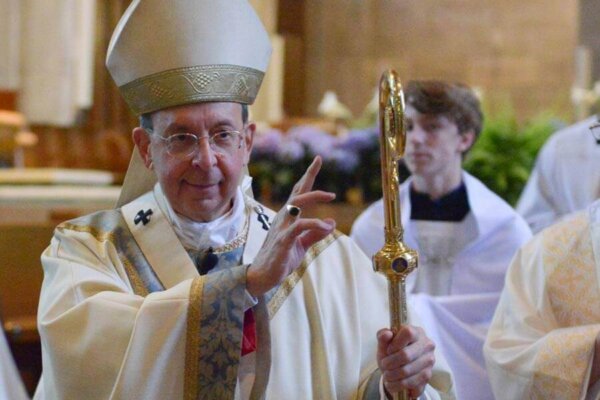Christmas (Mass at Midnight)
Cathedral of Mary Our Queen
December 24, 2024
When Caesar Augustus Ruled
In my many years of preaching Christmas homilies, I never focused on the first words of tonight’s reading from Luke’s Gospel: [It says:] “In those days a decree went out from Caesar Augustus that the whole world should be enrolled . . . .” Frankly, I thought Luke included that detail just to put the Birth of Jesus in its proper historical setting. But perhaps there’s more to it than that. After all, almost everything in Scripture is there for a reason, and the opening lines of tonight’s Gospel are likely no exception. So, what might this historical reference in our Gospel mean for us?
Luke reminds us that when Jesus was born the Roman Empire reigned supreme. Caesar Augustus, the emperor, was the great nephew, the adopted son, and the heir of Julius Caesar. After Julius Caesar’s assassination, the Roman Senate, in 42 B.C., declared him to be a god. His adopted son and successor took on the title “Augustus” – or venerable – & styled himself “the son of a god”, as if he were a minor deity in his own right. To be sure, Caesar Augustus considered himself the ruler of the entire world, including a lowly and remote outpost, known as Bethlehem of Judea. Caesar had at his command untold wealth, mighty armies, unmatched power, and it was his good fortune to rule over an empire largely at peace. As tonight’s Gospel opens, Caesar Augustus is exercising his power by mandating that everyone in the Roman Empire enroll in a census. This is what brought Joseph and Mary and her unborn Child to Bethlehem.
The King of kings and Lord of lords
It was against this backdrop, that, as Isaiah had prophesied, the King of kings & Lord of lords would be born in Bethlehem, the City of David: “A child is born to us, a son is given us, upon his shoulders dominion rests. They name him Wonder-Counselor, God-Hero, Father-forever, Prince of Peace.” This prophecy was fulfilled, not in a palace, but in a stable.
St. Luke tells us that Joseph and Mary had nowhere to go but a stable, perhaps a cave, a place where animals were kept. It was there that the Virgin Mary gave birth to Jesus, the One we acclaim as Son of God and Son of Mary. Mary wrapped her Baby in swaddling clothes and laid him a manger. Thus, did the living and true God come down from heaven. Thus, did the Eternal Son of God empty himself of glory. Before him, every idol, every claim of divinity, fades into nothingness.
Caesar extended his rule through a network of officials and subordinates. Who would extend the rule of the Newborn King? Shepherds tending their flocks in nearby fields were chosen, simple men awestruck at the night sky ablaze with God’s glory, awestruck to encounter an angel bearing the glad tidings of Jesus’ birth: “Do not be afraid [said the angel], for behold I proclaim to you good news of great joy that will be for all people. For today in the city of David a savior has been born for you who is Messiah and Lord.” The shepherds went to see for themselves. After encountering Joseph and Mary, and the Child in swaddling clothes, “they made known the message that had been told them about this child.” They were the first of many disciples of every time and place and culture who would spread the good news of salvation even to the ends of the earth. For, unlike Caesar, the rule of this Newborn King has no borders and his kingdom is without end.
Caesar, of course, had mighty armies in every corner of his empire. Who were the armies of the Newborn King? There were the angels, a numberless army of angels – Cherubim, Seraphim, Thrones, Dominations, singing with one accord: “Glory to God in the highest and on earth peace to people of goodwill.” These angels sang of God the Father’s plan and purpose to send his only Son into the world to redeem every nation, every people, and to bring us the peace the world cannot give – reconciliation with God. It is their song that we sang this very night.
Our First and Ultimate Allegiance
No, nothing in Scripture is accidental. Luke, it seems, wanted to contrast the august Roman emperor with the One who is truly Lord and Savior of every people and nation, the One who rules space and time, the One is our peace. Eventually, the Child born to Mary under Joseph’s watchful gaze would be condemned to death by the empire into which he was born. But he would rise on the third day, triumphing over sin and death, and over every outward show of power and might, he the Lord of History.
This night we not only peer into the manger to admire the image of the Newborn Lord and Savior – but we also enter into his gift of self in the Sacrifice of the Mass, as we receive him in Holy Communion: Body, Blood, Soul, and Divinity. We receive him as earthly citizens with a heavenly homeland. If we would be good citizens, prudent and virtuous, true advocates for peace, doers of charity and justice, lovers of the poor and vulnerable, then let us give proper allegiance to our country, but let our first and ultimate allegiance be to the One who is truly Lord of Heaven and Earth, the One who came, not to compete with Caesar’s earthly power, but to be the light of the world, to be the hope that does not disappoint, the One who truly loves the poor and hears their cry, the One whose love not even sin and death can conquer. Come, let us worship!


